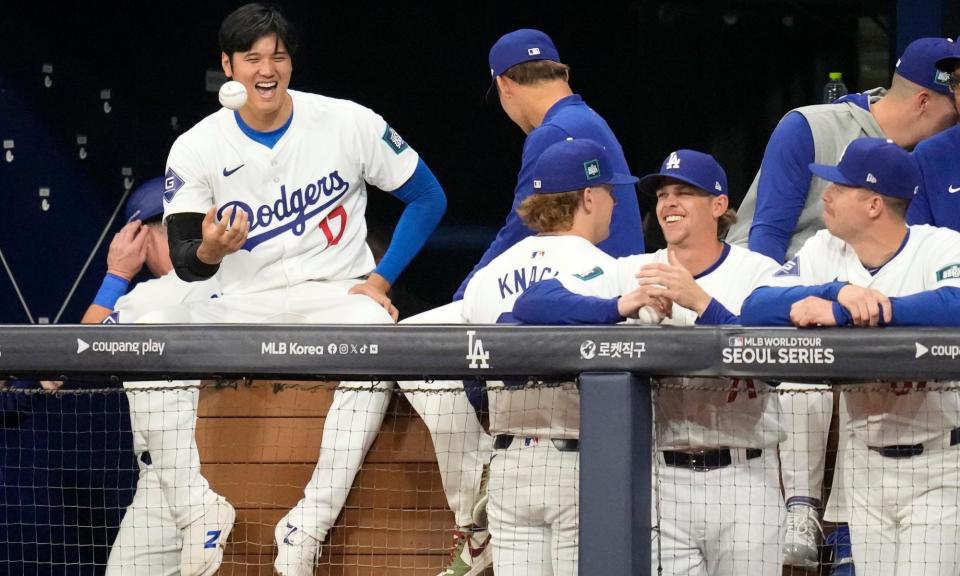Shohei Ohtani: a Japanese baseball star so loved even Koreans flock to him

The sport is American, the venue South Korean. But when the LA Dodgers and San Diego Padres open the Major League Baseball season with two games in Seoul this week, all eyes will be on a Japanese superstar: Shohei Ohtani.
It says much about Ohtani’s singular appeal that South Korean baseball fans are as excited about his imminent presence in the batter’s box at Gocheok Sky Dome as his legions of admirers in Japan.
The 29-year-old is widely considered to be one of the most talented players in baseball history – a once-in-a-century phenomenon who has been compared to another figure who starred as a pitcher and a slugger: Babe Ruth.
After six seasons with the Los Angeles Angels, in December Ohtani signed a deal with the Dodgers that will see him eventually earn $700m – the richest contract in North American sporting history.
It is no exaggeration to say that “Shotime” – twice named the American League’s most valuable player – has achieved national hero status in his native Japan since he left the Hokkaido Nippon Ham Fighters for the Angels in 2017, following a path laid out by his illustrious predecessors Hideo Nomo and Ichiro Suzuki.
Related: Shohei Ohtani lived out a fairytale as the World Baseball Classic came of age
Ohtani has eclipsed his yakyū compatriots to become one of the most talked about baseball players in living memory. Not even the injury to his right elbow that will keep him off the pitcher’s mound this season could dampen the sense of anticipation when the Dodgers arrived in South Korea for a series of warmups before the MLB games on Wednesday and Thursday.
Not usually given to heaping praise on athletes from their great sporting rival, Japan, South Korean sports fans make an exception for Ohtani, who has reciprocated with positive posts on his Instagram account and pronounced the South “one of my favourite countries”.
“The atmosphere in Korean society has often made it difficult for us to openly say we like Japan,” said Lee Jong-Sung, a sports culture expert at Hanyang University in Seoul. “I think Ohtani would perhaps be the first Japanese athlete who we can say we like. Maybe, some even consider him an honorary Korean citizen.”
That was mirrored in a Korean-language post on X: “The country that Ohtani likes the most is South Korea. The Japanese who South Koreans like the most is Ohtani,” it said.
The Japanese representation will not be confined to Ohtani, who will be joined by teammate Yoshinobu Yamamoto – who will be making his MLB debut and is the most expensive pitcher in history – and, for the Padres, Yu Darvish and Yuki Matsui.
Ohtani fever has intensified since he lead his country to victory in the last year’s World Baseball Classic, with Japan overcoming the defending champions, the US, in a 3-2 thriller.
After signing his record-breaking contract with the Dodgers in December, Ohtani managed to turn an eye-popping financial reward into a positive verdict on his character, suggesting to the team’s management that he be paid most of the sum in annual increments starting in 2034 to enable them to invest in more players now.
Off the field, too, he can do little wrong. A native of the north-eastern region of Japan devastated by the March 2011 triple disaster, Ohtani donated an undisclosed sum to the peninsula struck by a powerful earthquake on New Year’s Day. Last year he sent 60,000 baseball gloves to primary schools in Japan – enough for three gloves per school.
Like Japanese expat athletes before him, Ohtani is pursued by an army of journalists whose reports fill the pages of sports tabloids and serious broadsheets alike. Column inches have been devoted to the latest on his elbow injury and Ohtani’s dog, Dekopin.
He is the public face of multiple companies, including Porsche, the sportswear maker Asics, Japan Airlines and Mitsubishi UFJ Bank. Katsuhiro Miyamoto, a professor at Kansai University, estimated that his economic impact had reached ¥50.4bn ($334m) by the end of last year, adding that it would rise to ¥64.3bn ($427m) this year if Ohtani, who was a free agent when Miyamoto’s report was published, moved to the Dodgers.
“The economic impact of Ohtani’s success will be enormous,” he wrote, according to the Japan Times.
“Sho fever” can sometimes reach bizarre proportions. Japanese TV cut into regular programming to report the “breaking news” of Ohtani’s surprise announcement that he had married, with his wife’s identity only made public – again to blanket media coverage – weeks later. After he became the first Japanese player to win the American League home-run title in 2023, newspapers handed out special editions and Japan Post issued commemorative stamps and postcards. Last summer, rice paddies in his hometown were transformed into a giant illustration of its famous son.
The Dodgers arrived in Seoul at a rare moment of rapprochement between Japan and South Korea, whose conservative leaders have attempted to settle bitter disputes stemming from Japan’s 1910-45 colonial rule over the Korean peninsula.
Even so, few expected a Japanese athlete to enjoy these levels of adulation in South Korea, where hundreds of fans greeted the Dodgers at Incheon airport last week, shouting Ohtani’s name and holding up replica shirts. On Monday, they were out in force again, packing Gocheok Sky Dome to watch a warmup game against the South Korea national team.
“He is god,” Kang Ji-ho, a baseball fan, told Agence France-Presse as he queued outside the 17,000-seat stadium, where tickets for Wednesday’s MLB opener sold out in minutes. “Japanese players are not popular in Korea, but Ohtani is different.”
Ohtani has established himself as a peerless all-round ballplayer, a philanthropist and a respectful, if slightly wary, sports personality. This week he is carving out another, no less important role – that of goodwill ambassador.
The Associated Press contributed reporting

